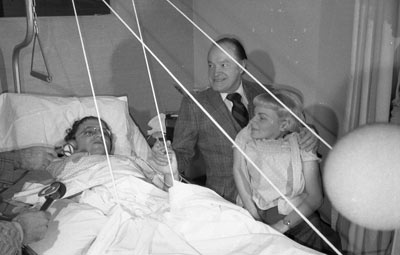
One of the best delights of the newspaper business is its unpredictability. Events, often unforeseen, dictate the course of the day. This can be exciting. Or, sometimes, it can be mortifying.
What makes me think of this is a project I’ve undertaken: I’m scanning into the computer the negatives from more than four decades of pictures I’ve taken to illustrate stories. There are tens of thousands of them.
The process is slow, so there’s time to reminisce. Some little stories stand out.
For instance, 1977 found me working in south Florida, at a dandy paper called The Broward Times. It came out several times each week, covered the community closely, and was seen as the paper of record for its area.
Its editor was the incomparable Ray Linders. A slight man with red hair and a red goatee, he had been editor of The Miami Herald before the parent company, Knight-Ridder, called upon him to start The Broward Times. At first he had been pretty much the entire staff, though bylines included names like “Remington,” “Underwood,” “Corona,” “Brother,” and so on — he wrote under pseudonyms, and to amuse himself had chosen the names of typewriters as the last names of his imaginary reporters.
There was by now a bigger staff of four reporters. As one of them, my duties included covering the always colorful city of Sunrise. Sunrise was run by Mayor John Lomelo, a jovial crook. (He would later do federal time for some kind of shakedown scheme he ran with a friend named Spike Liebowitz.) John’s latest controversy had come about when a city council member asked at a council meeting for an explanation of a construction project that had begun on city-owned land. Oh, said John, that was Sunrise Musical Theater. It turned out that without getting anyone’s permission he had floated a $6-million revenue bond issue to build a huge theater in the swamplands of western Sunrise. His reason was simple: he worshipped Frank Sinatra and this was a venue that might bring him to town. (It ultimately did.)
Now Sunrise Musical Theater was open and Bob Hope was soon to appear.
“Powell, come here!” It was morning and Ray Linders was summoning me to his office.
The sports editor of one of our sister papers, he told me, was named Ed Lang. Ed was a dwarf, and had a condition which made his bones very brittle. He had hoped to take his wife, also a dwarf, to see Bob Hope at Sunrise Musical Theater for their anniversary. But Ed had managed to run over himself with his car right after he had purchased the tickets. Why don’t I get on the phone to Hope’s people and see if I could arrange for Bob Hope to visit Ed in the hospital. I’d go along, take a picture and write a story, and Ed and the missus would be pleased and our mostly retired readers would think well of us.

Hope’s publicist, Les Lear, manifested all the cliches and caricatures associated with that profession. He was everybody’s best friend. He was adept at getting what he wanted. What he wanted was whatever most benefited his client. Always looking for an angle, he asked if Ed and his wife had ever been in the circus. (I am not making this up.) Finally it was agreed that Hope would pay a “surprise” visit to Ed in the hospital.
I put “surprise” in quotes because it cannot be a surprise if every television crew within 100 miles has been tipped off to it. Les Lear was a very effective publicist. If Ed and his wife hadn’t been in the circus before, they were surely in one now. Ed was like a spider in its web due to the various traction devices attached to his small, broken body. The hospital room was small, too, and crowded when its occupants came to include a half-dozen cameramen, a half-dozen sound men, me, Bob Hope, and, of course, Les Lear. Hope sat by the bed, Mrs. Lang perched on his lap. After three or four minutes, it was over.
I rushed my film to The Miami Herald — they were, after all, a sister Knight-Ridder paper and would want to run a picture — and when I finally got to sleep in the early hours of the next day I thought I had done well.
My strut turned to a hangdog shuffle within about a minute of my arriving at work the next day. Ray Linders was livid. How dare I have given the picture to The Herald?
I had a lot to learn about competition, it seemed.
We ran the story, but it wasn’t all that Ray had imagined, because we hadn’t scooped his former paper.
My great triumph in pulling it all off had been diminished.
Poor Ed and his wife, far from receiving the envisioned nice visit from an adored celebrity, had practically gotten trampled by television people.
Les Lear, though, was very happy. In his view, it had all worked out just fine.
Dennis E. Powell is crackpot-at-large to Open for Business. Powell was an award-winning reporter in New York and elsewhere before moving to Ohio and becoming a full-time crackpot. You can reach him at dep@drippingwithirony.com.